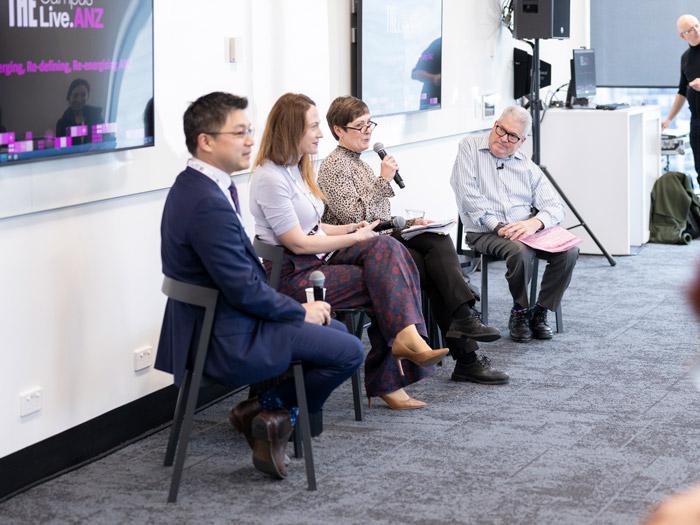
Partnerships to make higher education work for the workforce
You may also like
As the pace of change accelerates across all industries, higher education institutions face increasing pressure to ensure their graduates are prepared for the workplace demands of today – and tomorrow. Cultivating meaningful partnerships with industry is no longer optional; it’s necessary.
From curriculum co-design to experiential learning, universities can collaborate with businesses and industries in several ways to enhance student outcomes and strengthen regional economies.
Include industry in curriculum design from the start
Curriculum relevance is one of higher education’s most potent ways to demonstrate value to students and employers. We involve industry leaders early in curriculum development to ensure our programmes reflect current skill needs, technologies and practices.
- How to choose the right industry partners
- Bridge the gap between knowledge and solutions with industry partnerships
- How to work with industry in mutually beneficial ways
Consider these ideas for tapping into industry knowledge from the word go:
- Host co-design workshops to brainstorm course objectives and assessments.
- Incorporate feedback loops so the curriculum remains responsive over time.
- Schedule classes in correlation to a standard work schedule.
Adapt to changing skills demands
The shelf life of technical skills is shortening, and employers are constantly adjusting what they look for in talent. Higher education can stay relevant by actively tracking skills trends through qualitative and quantitative approaches.
Conduct employer surveys and roundtables annually. Gather firsthand insights from industry leaders about evolving skill requirements, hiring challenges and future workforce needs, and use this data to stay on top of trends.
Other ways to adapt to what employers are looking for:
- University-industry roundtables: Business schools can host annual forums with executives from Fortune 500 companies to discuss trends in leadership, data analytics and AI integration, among other things.
- Survey collaboration: Partner with organisations like the National Association of Colleges and Employers to distribute surveys that assess employer expectations for recent graduates, and use the results to revise curricula.
Use labour market analytics platforms to identify in-demand skills. Leverage real-time data to understand which skills are trending across industries and regions.
Lightcast offers granular insights into job postings, skill demand and regional hiring trends. A university might discover through Lightcast that demand for cybersecurity skills has surged in healthcare. In response, they could launch a certificate programme in healthcare cybersecurity.
LinkedIn Talent Insights may also prove useful. It can track workforce movement and skill gaps across sectors.
Create practice-based learning experiences
Students learn best when they can apply classroom knowledge to real-world challenges. Industry partners can provide those opportunities through internships, co-ops, applied research projects and more. Consider using capstone courses tied to actual business problems.
Strategic operations capstone (operations-based): Students partner with a local logistics company to optimise warehouse workflows. A challenge would involve, for example, reducing order fulfilment time by 15 per cent, using data analytics and process mapping.
Digital marketing analytics capstone (marketing-based): Students collaborate with a regional brand to increase social media engagement and conversion rates. They could use campaign performance data to refine target audience segmentation and produce a full marketing strategy with KPIs, audience profiles and creative assets to finish the course.
Paid internships with clear learning outcomes can also be beneficial, in corporate and field settings.
For example, partnering with a Fortune 500 firm focused on talent development. Students can learn how to apply theories of motivation and organisational behaviour in team settings and how to conduct performance reviews and provide constructive feedback under mentorship. They shadow managers, lead small projects and receive regular assessments tied to academic rubrics.
In paid internships in field settings, interns rotate through procurement, inventory and logistics departments. They learn how to use enterprise resource planning software to track and analyse inventory trends, and propose improvements in order batching and vendor management. Capstone projects can connect internship experiences like these with classroom operations models.
Innovation hubs or incubators on campus, co-run with industry partners, also benefit students.
Develop sustainable, two-way relationships
The most successful partnerships go beyond one-off projects. For long-term, strategic collaborations, it’s crucial to cultivate trust, ensure mutual benefit and maintain clear communication channels.
Assign a dedicated industry engagement coordinator. They can act as a single point of contact for all corporate partners, maintaining engagement calendars, scheduling site visits and facilitating feedback loops. Through this channel, you can set shared goals and metrics for partnership success, and recognise and celebrate partner contributions, such as awards, press releases and guest lectureships.
For example, you can use this to honour exemplary partners with categories like “Innovation Mentor of the Year” and “Alumni of the Year” (when they’ve assisted in a joint venture) and feature the winners in press releases and alumni newsletters.
The role could also support students and faculty in aligning academic outcomes with partner expectations, and track relationship milestones and identify new collaboration opportunities.
Higher education has a vital role in preparing learners for the future of work, and that future is being shaped in partnership with industry. We can drive innovation, equity and opportunity by intentionally co-designing programmes, staying attuned to the labour market, embedding real-world experiences and investing in long-term relationships.
Brooke Wilson is a compliance and risk management professional and an adjunct professor at Colorado State University Global (CSU). She is a faculty member for CSU Global’s MBA programme.
If you would like advice and insight from academics and university staff delivered direct to your inbox each week, sign up for the Campus newsletter.




